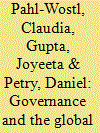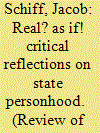|
|
|
Sort Order |
|
|
|
Items / Page
|
|
|
|
|
|
|
| Srl | Item |
| 1 |
ID:
085325


|
|
|
|
|
| Publication |
2008.
|
| Summary/Abstract |
Public policy on water has long been approached in the context of a locality, a country, or a river basin. However, scientific evidence now provides compelling arguments for adopting a global perspective on water management. This article argues that water governance today needs a multilevel design, including a significant global dimension. The discussion defines global water governance, highlights the implications for multilevel governance, and examines global water governance through the lens of governance typologies. The analysis along the categories of globalization/regionalization, centralization/decentralization, formality/informality, and state/nonstate actors and processes reveals that current global water governance is a fragmented, mobius-web arrangement. The article concludes by considering possible future trajectories of global water governance.
|
|
|
|
|
|
|
|
|
|
|
|
|
|
|
|
| 2 |
ID:
086152


|
|
|
|
|
| Publication |
2008.
|
| Summary/Abstract |
In a 2004 forum, Alexander Wendt, Patrick Jackson, Colin Wight and Iver Neumann asked two questions about state personhood: Are states real, or merely as-if? Are they people? I question the terms of their debate, which relies upon a problematic distinction between 'real' and 'as if'. Drawing largely upon Foucault, I challenge that distinction. This challenge has important theoretical and normative implications. Theoretically, a discourse of state personhood is completely unnecessary to understand world politics. Normatively, by tightly linking personhood and responsibility, some of the authors obscure important dimensions of responsibility to and respect for the non-human world.
|
|
|
|
|
|
|
|
|
|
|
|
|
|
|
|
| 3 |
ID:
086768


|
|
|
|
|
| Publication |
2009.
|
| Summary/Abstract |
Since Tocqueville's seminal writings, voluntary associations have been proclaimed to be schools of democracy. According to this claim, which regained popularity during the 1990s, involvement in voluntary associations stimulates political action. By participating in these associations, members are socialised to become politically active. Supposedly, having face-to-face contact with other members induces civic mindedness - the propensity to think and care more about the wider world. Participating in shared activities, organising meetings and events, and cooperating with other members are claimed to induce civic skills and political efficacy. Over the years, many authors have elaborated on these ideas. This article offers a systematic examination of the neo-Tocquevillian approach, putting the theoretical ideas to an empirical test. It offers a critical overview of the literature on the beneficial role of voluntary associations and dissects it into five testable claims. Subsequently, these claims are tested by cross-sectional, hierarchical analyses of 17 European countries. The authors conclude that the neo-Tocquevillian theory faces serious lack of empirical support. In line with the expectations, they find a strong, positive correlation between associational involvement and political action. Moreover, this correlation is positive in all countries under study. However, more informative hypotheses on this correlation are falsified. First, the correlation is stronger for interest and activist organisations than for leisure organisations. Second, passive (or 'checkbook') members show much higher levels of political action than non-involved, whereas the additional effects of active participation are marginal. Third, the correlation between associational involvement and political action is not explained by civic skills and civic mindedness. In sum, the authors find no evidence for a direct, causal relation between associational involvement and political action. The socialisation mechanism plays a marginal role at best. Rather, this article's findings imply that selection effects account for a large part of the correlation between associational involvement and political action. The conclusion reached therefore is that voluntary associations are not the schools of democracy they are proclaimed to be, but rather pools of democracy.
|
|
|
|
|
|
|
|
|
|
|
|
|
|
|
|
| 4 |
ID:
111972


|
|
|
|
|
| Publication |
2012.
|
| Summary/Abstract |
Since the early 1990s, the large-N civil war research program has been a vibrant one but has reached an analytical plateau because methodological issues have obscured fundamental conceptual and theoretical concerns. The existing ground-clearing work has shed light on macro- and micro-level determinants of internal conflict onset, duration, and termination, but has left the field theoretically impoverished. This article discusses remaining gaps in the quantitative civil war literature, and proposes conceptual, theoretical, and methodological remedies. Five main lacunae are identified. First, civil war may be a longer process, with several waves of escalation and de-escalation, than generally described in the extant literature. Second, existing theories conflate civil conflict with violence-war onset and violence may be conceptually distinct. Third, we have few systemic-level theories of civil war onset and duration. Fourth, we need better theories that allow us to determine whether civil wars are different from other types of wars. Finally, we need to go beyond state-centric monadic approaches, and be more rigorous when building our models for explaining civil war onset, duration, or termination.
|
|
|
|
|
|
|
|
|
|
|
|
|
|
|
|
|
|
|
|
|